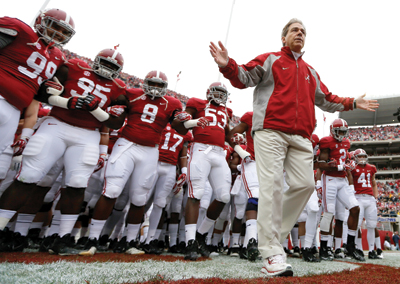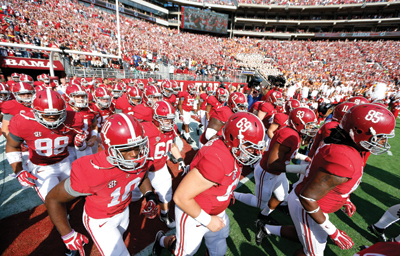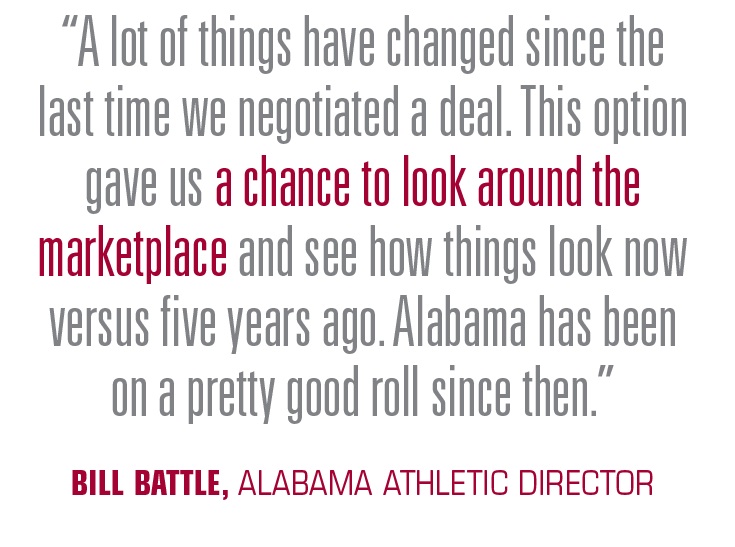 |
Photo by: GETTY IMAGES
|
Roll Tide is right.
The University of Alabama is set to capitalize on its success over the last five years by signing one of the nation’s most lucrative multimedia rights deals with Learfield Sports worth at least $150 million to $160 million over 10 years.
The extension of a long-term relationship between the Crimson Tide and Learfield will now run through June 30, 2024. Alabama,
{podcast}
SBJ Podcast:
College writer Michael Smith and Executive Editor Abraham Madkour talk about Alabama's lucrative deal with Learfield Sports, as well as Northwestern Mutual's presenting sponsorship with the Rose Bowl.
which has been with Learfield since 1998, took advantage of an opt-out in its previous deal to renegotiate. The school, which did not talk to other companies, could make even more money through a revenue-share — on top of the guarantee — if Learfield’s sales top certain thresholds.
The new financial terms of $15 million to $16 million a year double Alabama’s guarantee previously and put the Tide among the top three schools in multimedia rights revenue behind Texas and Notre Dame, both of which have unique TV arrangements that boost their overall figure.
“A lot of things have changed since the last time we negotiated a deal,” said Bill Battle, Alabama’s athletic director. “This option gave us a chance to look around the marketplace and see how things look now versus five years ago. Alabama has been on a pretty good roll since then.”
The Tide has won three of the last five college football national championships, which drives up the value in Alabama’s property and provides the rights holder the opportunity to develop additional inventory.
“We’ve been there a long time,” Learfield CEO Greg Brown said of the relationship with Alabama. “In the early days of the relationship, football wasn’t as good and there were some challenges. But even then, the business did very well and we’re very confident in the long-term strength of the brand. When you think about Alabama’s stability and continuity, it’s almost unlike any other in college sports.”
The deal was the first at Alabama for Battle, who became AD in March 2013. He reopened talks with Learfield last fall and hired Tom Stultz of JMI Sports to consult with the school. Stultz formerly worked at Host Communications and IMG College on the rights-holder side of the business.
Alabama decided to keep its contract with Learfield virtually the same, except for the increase in the annual guarantee. The only significant difference is that Learfield will not have rights to Alabama’s third-tier football and basketball games, which now are controlled by the SEC Network.
One of the reasons the deal is so valuable compared to other schools is because Learfield controls several rights that are not typically included in multimedia agreements. Those rights include concessions, pouring rights, isotonic beverage, seat rentals and merchandise, which combined can account for 25 percent to 30 percent of the revenue from the property.
Pouring rights, concessions and isotonic are usually sold by the school, not the rights holder. Learfield sold pouring rights to Coca-Cola, isotonic to Gatorade, and concessions to Centerplate, and those deals will continue, Brown said. Learfield’s other rights include traditional multimedia inventory like radio, corporate sponsorship, hospitality, print, signage and other advertising. The Tide does not plan to add alcohol sales inside the stadium, Battle said.
As part of the renegotiation, Alabama will make improvements to its concession areas and point-of-sale signage in Bryant-Denny Stadium by adding TVs and possibly some LED signage in the concourses. Those electronic additions will provide Learfield with new advertising inventory.
“That will make it look better,” Battle said. “The concessions under the stadium look pretty archaic. If you’re out there for any length of time, you lose touch with what’s going on with the game. The TVs will help that.”
 |
Alabama football has won three of the last five national championships.
Photo by: GETTY IMAGES
|
Alabama’s athletic department reported revenue of $143.4 million for the 2012-13 fiscal year, according to the Department of Education, and the new Learfield deal will boost that figure once it begins in 2014-15.
Texas led the nation in 2012-13 total athletic department revenue at $165.7 million. Texas, which has its multimedia rights with IMG College, makes $15 million annually from ESPN for the Longhorn Network, while its more traditional multimedia rights generate close to $10 million, for a total of $25 million a year.
Notre Dame’s rights are splintered — NBC has home TV football, IMG College has radio, and its corporate sponsorship is sold internally. The Irish’s total multimedia revenue is believed to be in the range of $25 million to $30 million annually.
Comparing multimedia deals is difficult because what rights are included can vary from one deal to the next, but among schools with traditional multimedia rights deals and no network affiliation, Alabama’s new deal will make it the clear leader. Ohio State and Georgia each make close to $11 million a year from IMG College, but neither deal has as many rights as Alabama’s.
“Alabama was able to stay with its rights holder and got full market value,” Stultz said.
Learfield shares the Alabama contract with IMG College in a joint arrangement, but Learfield owns majority share of the deal and controlling interest.






